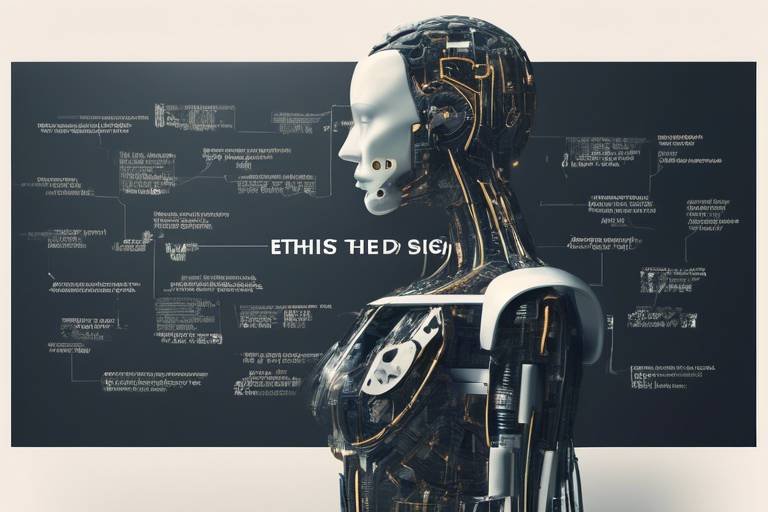Respecting Rights: AI Ethics in Surveillance
In today's digital age, the intersection of technology and ethics is more critical than ever, especially when it comes to the use of artificial intelligence (AI) in surveillance. As we embrace the conveniences and efficiencies that AI brings, we must also grapple with the ethical implications of its application in monitoring individuals and communities. The balance between enhancing public safety and respecting individual rights is a delicate one, and it raises important questions about privacy, consent, and the potential for misuse. Are we sacrificing our freedoms for the sake of security? This article delves into the ethical landscape of AI surveillance, emphasizing the necessity of maintaining respect for human rights while leveraging technology for the greater good.
AI technologies have revolutionized the way we approach surveillance. With the ability to process vast amounts of data quickly and accurately, AI systems can identify patterns, track movements, and analyze behaviors in ways that were previously unimaginable. From facial recognition software to predictive policing algorithms, these tools offer law enforcement and security agencies unprecedented capabilities. However, this transformation comes with significant ethical concerns. As AI systems become more integrated into our daily lives, the potential for infringing on civil liberties, such as the right to privacy, becomes a pressing issue. How do we ensure that these powerful tools are used responsibly and ethically?
As AI surveillance systems become more prevalent, the risks to individual privacy escalate. Data breaches and unauthorized access to sensitive information have become alarmingly common, raising the stakes for personal privacy. It's essential to recognize that the data collected through surveillance can be misused, leading to a loss of trust between individuals and institutions. To mitigate these risks, robust data protection measures must be implemented. This includes strong encryption, strict access controls, and clear policies regarding data retention and usage. Ultimately, individuals should have a say in how their data is collected and utilized. After all, privacy is not just a privilege; it's a fundamental human right.
Understanding the legal landscape surrounding AI surveillance is crucial for navigating the ethical challenges it presents. Various laws and regulations exist to govern surveillance practices, but their effectiveness can vary significantly. For instance, many countries have enacted data protection laws that aim to safeguard individual privacy. However, the enforcement of these laws often lags behind technological advancements. It is vital for lawmakers to stay ahead of the curve, ensuring that legislation keeps pace with the rapid development of AI technologies. The question remains: Are current legal frameworks sufficient to protect individual rights in the face of evolving surveillance capabilities?
In an increasingly interconnected world, international standards and guidelines play a pivotal role in shaping ethical practices in AI surveillance. Organizations such as the United Nations and the European Union have established frameworks aimed at protecting human rights in the context of technology. These guidelines emphasize the importance of transparency, accountability, and public participation in surveillance practices. The challenge lies in ensuring that countries adhere to these standards and work collaboratively to address the ethical dilemmas posed by AI surveillance. Global cooperation is essential to creating a unified approach to protecting individual rights.
The approach to surveillance legislation varies significantly from country to country, reflecting different cultural values and priorities. In some nations, robust privacy protections are enshrined in law, while others prioritize security measures that may infringe upon individual rights. This patchwork of regulations raises ethical concerns, as individuals in different jurisdictions may experience vastly different levels of protection. As we navigate this complex landscape, it is crucial to advocate for more consistent and comprehensive legislation that respects privacy rights while addressing security needs.
Public attitudes toward AI surveillance are shaped by various factors, including perceptions of safety, privacy, and trust in technology. While some individuals may view surveillance as a necessary tool for enhancing security, others express concerns about the potential for abuse and loss of autonomy. This dichotomy underscores the importance of engaging with the public to foster dialogue about the ethical implications of AI surveillance. Building trust requires transparency and accountability from those who implement these technologies. How can stakeholders work together to ensure that surveillance practices align with societal values and expectations?
To navigate the complex ethical landscape of AI surveillance, it is essential to adopt robust ethical frameworks that prioritize human rights and social justice. Various approaches can guide the development and implementation of surveillance systems, ensuring that they respect individual freedoms while addressing security concerns. These frameworks should encourage inclusive dialogue among stakeholders, including governments, tech companies, and civil rights organizations. By fostering collaboration, we can create a more ethical approach to AI surveillance that serves the interests of all members of society.
When considering the ethics of AI surveillance, two primary ethical approaches emerge: utilitarianism and deontology. Utilitarianism focuses on the outcomes of actions, advocating for the greatest good for the greatest number. In contrast, deontological ethics emphasizes the importance of adhering to moral principles, regardless of the consequences. Each perspective offers valuable insights into the ethical dilemmas posed by AI surveillance. Policymakers must carefully weigh these approaches to develop regulations that balance societal benefits with the protection of individual rights.
Engaging various stakeholders in discussions about AI surveillance is crucial for developing ethical practices. Governments, tech companies, and civil rights organizations each bring unique perspectives to the table. By fostering inclusive dialogue, we can identify common ground and address concerns about privacy, security, and accountability. This collaborative approach is essential for shaping ethical surveillance practices that respect individual rights and promote social justice.
- What are the main ethical concerns regarding AI surveillance? The primary concerns include privacy violations, potential misuse of data, and the lack of transparency in surveillance practices.
- How can individuals protect their privacy in an AI surveillance world? Individuals can advocate for stronger data protection laws, be aware of their digital footprints, and utilize privacy-enhancing technologies.
- What role do governments play in regulating AI surveillance? Governments are responsible for creating and enforcing laws that protect individual rights while balancing security needs.
- Are there international standards for AI surveillance? Yes, organizations like the United Nations and the European Union have established guidelines to protect human rights in the context of AI technologies.

The Role of AI in Modern Surveillance
In the ever-evolving landscape of technology, artificial intelligence (AI) has emerged as a game changer, particularly in the realm of surveillance. Gone are the days when surveillance was limited to a few static cameras and manual monitoring. Today, AI technologies have revolutionized how we collect, analyze, and interpret data, leading to unprecedented levels of efficiency and effectiveness. Imagine walking through a busy city street and knowing that AI is constantly analyzing the environment, identifying potential threats, and helping law enforcement respond in real-time. Sounds impressive, right? But it also raises some serious questions about our privacy and civil liberties.
AI enhances surveillance capabilities through various means, including facial recognition, behavioral analysis, and predictive policing. These technologies enable law enforcement agencies and private entities to monitor public spaces and gather intelligence more effectively than ever before. For instance, facial recognition technology can identify individuals in crowded areas, while behavioral analysis can detect unusual activities that may indicate criminal behavior. However, this efficiency comes at a cost, as it often leads to a trade-off between security and privacy.
One of the most significant implications of AI in surveillance is the sheer volume of data that can be collected. With the integration of AI algorithms, surveillance systems can process vast amounts of information in real-time, identifying patterns and anomalies that would be impossible for human operators to detect. This capability not only enhances public safety but also raises concerns about data privacy and the potential for misuse. For example, consider a scenario where a city's surveillance system is hacked, exposing sensitive personal data of thousands of individuals. This not only compromises individual privacy but also undermines public trust in these technologies.
Moreover, the ethical implications of AI-driven surveillance extend beyond mere data collection. The algorithms that power these systems can inadvertently perpetuate bias and discrimination. If the data used to train these algorithms is skewed, the outcomes can be biased, leading to unfair targeting of certain groups. This is particularly concerning in communities already facing systemic inequalities. The challenge lies in ensuring that while we harness the power of AI for security, we also safeguard the rights and freedoms of individuals.
As we navigate this complex landscape, it is crucial to strike a balance between leveraging AI for public safety and respecting individual rights. This involves not only implementing robust data protection measures but also fostering transparency and accountability in how these technologies are deployed. The conversation around AI in surveillance is just beginning, and it is imperative that we engage in a thoughtful dialogue about the ethical implications of these advancements.
In summary, AI has transformed the landscape of surveillance, providing tools that enhance security and efficiency. However, with great power comes great responsibility. As we embrace these technologies, we must remain vigilant about the ethical concerns they raise, ensuring that our pursuit of safety does not come at the expense of our fundamental rights.

Privacy Concerns and Data Protection
In today’s digital age, the intersection of artificial intelligence and surveillance has sparked significant debate, particularly around the issue of privacy. As AI technologies become more integrated into surveillance systems, they offer unprecedented capabilities for monitoring and data collection. However, this advancement comes with a heavy price—our privacy. Imagine a world where every movement you make is tracked, analyzed, and stored. Sounds dystopian, right? Yet, this is the reality many face as AI surveillance systems proliferate.
The potential risks to individual privacy are alarming. For instance, data breaches are not just a possibility; they are a growing concern. With vast amounts of personal information being collected and stored, the likelihood of unauthorized access increases. Consider the implications: sensitive data about your daily activities, preferences, and even your location could fall into the wrong hands. This is not just about inconvenience; it can lead to identity theft, discrimination, and even harassment. The need for robust data protection measures has never been more critical.
Furthermore, the concept of consent is often murky in the realm of AI surveillance. Many individuals are unaware that they are being monitored or that their data is being collected. This lack of transparency raises ethical questions: Are we truly giving our consent when we have no idea what we are agreeing to? The answer is often a resounding no. It’s essential that individuals are informed about what data is being collected, how it is used, and who has access to it. Only then can they make informed choices about their privacy.
To illustrate this point, let’s take a look at some key privacy concerns associated with AI surveillance systems:
- Data Breaches: Unauthorized access to personal data can lead to severe consequences.
- Lack of Transparency: Many systems operate without clear disclosure of data collection practices.
- Surveillance Overreach: The potential for excessive monitoring can infringe on civil liberties.
In light of these concerns, it’s imperative that we establish comprehensive data protection frameworks. These frameworks should not only focus on preventing data breaches but also prioritize the ethical use of AI technologies. Governments and organizations must implement stringent regulations that require companies to adopt best practices in data security and privacy. Additionally, regular audits and assessments of surveillance systems can help ensure compliance with these regulations, safeguarding individuals’ rights.
In summary, as we embrace the benefits of AI in surveillance, we must remain vigilant about the associated privacy concerns. The balance between security and individual rights is delicate, and it is our responsibility to advocate for ethical practices that protect our personal information. After all, in a world increasingly driven by data, our privacy should never be an afterthought.
- What are the main privacy concerns regarding AI surveillance?
Privacy concerns include data breaches, lack of transparency, and potential surveillance overreach. - How can individuals protect their privacy in a surveillance-heavy environment?
Individuals can protect their privacy by staying informed about data collection practices and advocating for stronger data protection regulations. - What role do governments play in regulating AI surveillance?
Governments are responsible for creating and enforcing laws that protect individual privacy rights in the context of AI surveillance.

Legal Frameworks Governing Surveillance
In today's world, where the line between safety and privacy is increasingly blurred, understanding the is crucial. These laws and regulations are designed to strike a balance between the need for security and the protection of individual rights. Different countries have established various legal standards to address the challenges posed by modern surveillance technologies, particularly those powered by artificial intelligence (AI).
At the heart of these frameworks lies the principle that surveillance should be conducted in a manner that respects civil liberties and upholds human rights. In many jurisdictions, laws such as the General Data Protection Regulation (GDPR) in Europe set stringent guidelines on how personal data can be collected, stored, and used. These regulations mandate that individuals must be informed about the data being collected and have the right to access and delete their information. This is particularly relevant in the context of AI surveillance, where vast amounts of personal data can be processed to identify and track individuals.
Moreover, in the United States, the Fourth Amendment protects citizens from unreasonable searches and seizures, which has been interpreted to extend to digital surveillance practices. This legal backdrop raises significant questions about the extent to which AI technologies can be deployed in public spaces without infringing on personal privacy. For instance, the use of facial recognition technology by law enforcement agencies has sparked debates about its legality and ethical implications. Critics argue that such practices often occur without proper oversight or accountability, leading to potential abuses of power.
In addition to national laws, international treaties and agreements also play a role in shaping surveillance practices. The International Covenant on Civil and Political Rights (ICCPR) emphasizes the right to privacy and provides a framework for countries to follow. This highlights the need for global cooperation in addressing the ethical use of AI in surveillance systems. Countries must work together to establish common standards that protect individual rights while allowing for the legitimate use of surveillance technologies.
To further illustrate the complexities of legal frameworks governing surveillance, consider the following table that outlines key elements of various laws and regulations around the world:
| Country | Legal Framework | Key Features |
|---|---|---|
| United States | Fourth Amendment | Protection against unreasonable searches; requires warrants for surveillance in many cases. |
| European Union | General Data Protection Regulation (GDPR) | Strict data protection rules; individuals have rights to access, correct, and delete personal data. |
| United Kingdom | Investigatory Powers Act | Regulates how public authorities can use surveillance; includes provisions for oversight. |
| Australia | Telecommunications (Interception and Access) Act | Allows government interception of communications with a warrant; includes privacy protections. |
As we navigate this complex landscape, it's evident that the legal frameworks governing surveillance must evolve to keep pace with technological advancements. Policymakers, legal experts, and civil rights advocates need to engage in continuous dialogue to ensure that surveillance practices not only enhance public safety but also respect the fundamental rights of individuals.
- What is the primary goal of surveillance laws?
The primary goal is to balance public safety with the protection of individual rights and freedoms. - How do different countries approach surveillance?
Countries vary in their legal frameworks, with some offering stronger protections for privacy than others. - Why is AI surveillance a concern?
AI surveillance can lead to mass data collection and potential abuses of power, raising significant ethical and legal questions.

International Standards and Guidelines
In the rapidly evolving landscape of artificial intelligence (AI), particularly within the realm of surveillance, the establishment of is paramount. These frameworks serve as a beacon, guiding nations and organizations toward ethical practices that respect individual rights while harnessing the power of technology for security and public safety. The significance of these standards cannot be overstated, as they aim to create a cohesive approach to AI surveillance that transcends borders and cultural differences.
One of the leading organizations in this field is the United Nations, which has been proactive in advocating for human rights in the context of emerging technologies. The UN's Guiding Principles on Business and Human Rights provide a foundational framework that emphasizes the responsibility of businesses and governments to protect human rights, including privacy rights, in their surveillance practices. This includes ensuring that any data collection is both necessary and proportionate, minimizing the risk of infringing on individual freedoms.
Moreover, the European Union has taken significant steps in formulating regulations such as the General Data Protection Regulation (GDPR), which sets stringent requirements for data processing and privacy. These regulations not only protect citizens within the EU but also influence global standards as companies worldwide adapt to comply with these laws. The GDPR underscores the importance of obtaining explicit consent from individuals before collecting their data, thereby reinforcing the principle of informed consent in surveillance practices.
In addition to these frameworks, various non-governmental organizations (NGOs) and advocacy groups have developed guidelines that focus on the ethical use of AI in surveillance. For instance, the Electronic Frontier Foundation (EFF) and Privacy International have published recommendations that emphasize transparency, accountability, and the need for independent oversight in surveillance operations. These guidelines advocate for the establishment of independent bodies that can monitor the deployment of AI surveillance technologies, ensuring they are used responsibly and ethically.
However, the challenge remains in achieving global cooperation and compliance with these standards. Countries vary significantly in their approach to surveillance legislation, influenced by cultural, political, and historical factors. To foster a more unified stance, international dialogues and collaborations are essential. Initiatives like the Global Privacy Assembly bring together policymakers and stakeholders from around the world to discuss best practices, share knowledge, and develop strategies that promote human rights in the age of AI.
To summarize, the establishment of international standards and guidelines for AI surveillance is crucial for protecting individual rights and ensuring ethical practices. As nations navigate the complex interplay between security and privacy, these frameworks will serve as essential tools for promoting accountability, transparency, and respect for human dignity in the digital age.
- What are the main international standards for AI surveillance? International standards include guidelines from the United Nations, the European Union's GDPR, and recommendations from various NGOs focused on privacy and human rights.
- How does the GDPR impact global surveillance practices? The GDPR sets strict rules for data processing and privacy, influencing companies worldwide to adopt similar practices to comply with these regulations.
- Why is global cooperation important in AI surveillance? Global cooperation ensures that surveillance practices respect human rights universally, creating a cohesive approach to ethical AI use across borders.

National Legislation Variances
When it comes to AI surveillance, the landscape of national legislation is anything but uniform. Different countries have adopted varying approaches to regulating surveillance practices, which can lead to significant disparities in the protection of individual privacy rights. For instance, while some nations have embraced stringent laws that prioritize the protection of civil liberties, others have taken a more laissez-faire approach, allowing for expansive surveillance capabilities that could infringe on personal freedoms.
In Europe, the General Data Protection Regulation (GDPR) sets a high standard for data protection and privacy, ensuring that individuals have greater control over their personal information. This regulation mandates transparency in data collection and processing, allowing citizens to know how their data is used, and it imposes hefty fines on organizations that fail to comply. In stark contrast, countries like China have implemented extensive surveillance systems that prioritize state security over individual privacy, leading to a society where citizens are constantly monitored.
The implications of these legislative variances extend beyond mere compliance; they reflect deeper societal values and priorities. For example, in the United States, the legal landscape is characterized by a patchwork of federal and state laws, which can create confusion and inconsistencies regarding privacy rights. The USA PATRIOT Act and other legislation have expanded surveillance capabilities significantly, often at the expense of civil liberties, leading to ongoing debates about the balance between security and privacy.
Moreover, the differences in legislation can create challenges for multinational companies that operate across borders. These organizations must navigate a complex web of regulations that can vary dramatically from one jurisdiction to another. For instance, a tech company may find its AI surveillance solutions compliant with GDPR in Europe but face significant legal hurdles in countries with less stringent regulations. This inconsistency not only complicates operational procedures but also raises ethical questions about the responsibility of these companies to uphold human rights standards globally.
To illustrate these variances, consider the following table that summarizes the key differences in AI surveillance legislation among selected countries:
| Country | Key Legislation | Privacy Protections | Surveillance Approach |
|---|---|---|---|
| United States | USA PATRIOT Act | Limited | Extensive |
| European Union | GDPR | Strong | Regulated |
| China | Cybersecurity Law | Weak | State-controlled |
| Canada | Personal Information Protection and Electronic Documents Act (PIPEDA) | Moderate | Balanced |
As we can see, the approach to AI surveillance and privacy rights varies greatly from one nation to another. This divergence not only affects how citizens experience surveillance but also shapes the global conversation about ethics in technology. As countries continue to develop their policies, it is crucial for lawmakers to consider the implications of their decisions on individual rights and the broader societal impact of surveillance technologies.
- What is AI surveillance? AI surveillance refers to the use of artificial intelligence technologies to monitor individuals and collect data, often for security purposes.
- How does legislation affect AI surveillance? Different countries have varying laws that govern how AI surveillance can be implemented, impacting privacy rights and individual freedoms.
- Why are privacy protections important? Privacy protections are essential to safeguard individual rights and prevent misuse of personal data, ensuring that technology serves the public good without infringing on freedoms.

Public Perception and Acceptance
When it comes to the intersection of technology and our daily lives, public perception plays a crucial role in determining how AI surveillance is embraced or resisted. Imagine walking down a street where every move you make is captured by a camera equipped with advanced AI. Some people might feel a sense of security, thinking that such measures can help prevent crime, while others might feel a twinge of discomfort, questioning whether their privacy is being compromised. This dichotomy is at the heart of the debate surrounding AI surveillance.
Research indicates that public attitudes towards AI surveillance are influenced by several factors, including personal experiences, media portrayals, and cultural contexts. For instance, in regions where crime rates are high, citizens may be more inclined to accept surveillance technologies if they believe it enhances their safety. Conversely, in areas where privacy is highly valued, there may be significant pushback against such technologies. This acceptance can also be swayed by how transparent the implementation of these systems is. If people feel that they are being monitored without their knowledge or consent, resistance is likely to grow.
Furthermore, the narrative around AI surveillance is often shaped by sensational media coverage, which can amplify fears or misconceptions. For example, stories highlighting data breaches or misuse of surveillance footage can lead to a general mistrust of AI technologies. Conversely, positive stories showcasing successful crime prevention efforts can bolster public support. This creates a complex landscape where the same technology can be viewed as both a protector and a potential threat, depending on the context in which it is discussed.
To better understand this phenomenon, consider the following table that summarizes key factors influencing public perception:
| Factor | Influence on Perception |
|---|---|
| Personal Experience | Individuals who have been victims of crime may support surveillance for safety, while those who value privacy may oppose it. |
| Media Representation | Negative stories about surveillance misuse can lead to distrust, while positive stories about crime prevention can enhance acceptance. |
| Cultural Context | Different societies have varying attitudes toward privacy and security, influencing acceptance levels. |
| Transparency of Implementation | Clear communication about how surveillance data is used can foster trust or, conversely, lead to suspicion. |
Ultimately, the acceptance of AI surveillance hinges on a delicate balance between perceived safety and the right to privacy. Engaging the public in discussions about these technologies is essential. By fostering dialogue and addressing concerns, stakeholders can work towards building a surveillance framework that respects individual rights while also enhancing community safety. This collaborative approach can help bridge the gap between technology and public sentiment, paving the way for a more informed and balanced acceptance of AI surveillance systems.
- What are the main concerns regarding AI surveillance? Many people worry about privacy violations, data security, and the potential for misuse of surveillance data.
- How can public trust in AI surveillance be improved? Transparency, community engagement, and clear communication about the purpose and use of surveillance technologies are key.
- Are there any regulations governing AI surveillance? Yes, various laws and regulations exist, but they can vary significantly by country and region.

Ethical Frameworks for AI Surveillance
As we dive deeper into the world of AI surveillance, it's crucial to establish ethical frameworks that guide the development and implementation of these technologies. After all, the balance between security and individual rights is delicate, and we must tread carefully. Ethical frameworks serve as a compass, guiding us through the murky waters of privacy, consent, and societal impact. They help ensure that while we leverage AI for enhanced security, we do not trample on the rights of individuals.
One of the most prominent frameworks in this discussion is the Utilitarian approach, which emphasizes the greatest good for the greatest number. This perspective often supports increased surveillance if it leads to reduced crime rates and enhanced public safety. However, the question arises: at what cost? While a utilitarian approach may justify invasive surveillance measures, it can lead to the marginalization of minority groups or those who are already vulnerable. The potential for abuse becomes a critical point of concern.
On the other hand, we have the Deontological approach, which is rooted in the belief that certain rights must never be violated, regardless of the outcomes. This perspective champions the idea of inviolable rights, arguing that individuals should have the right to privacy and autonomy. Under this framework, any form of surveillance that infringes upon these rights is inherently unethical, regardless of its intended purpose. The challenge here is how to reconcile these two approaches in a practical, real-world context.
Moreover, the involvement of various stakeholders adds another layer of complexity to the ethical landscape. Governments, tech companies, and civil rights organizations all have different priorities and perspectives. For instance, while governments may prioritize national security, tech companies might focus on innovation and profit, and civil rights organizations advocate for individual freedoms and privacy. This divergence necessitates an inclusive dialogue among all parties to shape ethical surveillance practices that respect human rights while addressing legitimate security concerns.
To facilitate this dialogue, we can consider creating multi-stakeholder frameworks that allow for diverse inputs and perspectives. Such frameworks could include regular consultations, public forums, and collaborative policy-making processes aimed at ensuring that surveillance technologies are developed and implemented ethically. The goal should be to create a system that not only enhances security but also fosters trust and accountability.
In conclusion, the ethical frameworks surrounding AI surveillance are not just abstract concepts; they are vital to shaping a future where technology serves humanity without compromising our fundamental rights. As we continue to navigate this complex terrain, it’s essential to remain vigilant and proactive in advocating for ethical practices that prioritize individual rights and societal well-being.
- What are the main ethical frameworks for AI surveillance?
The primary frameworks include Utilitarianism, which focuses on the greatest good for the greatest number, and Deontology, which emphasizes inviolable rights and duties. - Why is it important to consider multiple stakeholder perspectives?
Different stakeholders have varying priorities that can significantly influence the ethical implications of surveillance technologies. Inclusive dialogue helps ensure that all voices are heard. - How can we ensure that AI surveillance is ethically implemented?
Establishing multi-stakeholder frameworks, regular consultations, and public forums can help foster ethical practices in AI surveillance.

Utilitarian vs. Deontological Approaches
When it comes to the ethical landscape surrounding AI surveillance, two prominent frameworks often come into play: utilitarianism and deontological ethics. Understanding these approaches can illuminate the complex decisions that policymakers and technologists face as they navigate the murky waters of surveillance ethics. At its core, utilitarianism is all about the outcomes. It suggests that the best action is the one that maximizes overall happiness or utility. In the context of AI surveillance, this could mean justifying the use of surveillance technologies if they lead to greater public safety, reduced crime rates, or enhanced national security. Imagine a city where crime rates plummet because of effective surveillance systems; proponents of utilitarianism would argue that the benefits outweigh the potential costs to individual privacy.
On the flip side, we have deontological ethics, which emphasizes the importance of rules, duties, and rights. This approach posits that certain actions are inherently right or wrong, regardless of their consequences. In the realm of AI surveillance, a deontologist might argue that invading an individual's privacy is morally unacceptable, even if it leads to a safer society. They would stress that individuals have a fundamental right to privacy that should not be compromised for the sake of collective security. This perspective often resonates with civil rights advocates who caution against the slippery slope of sacrificing personal freedoms for perceived safety.
So, how do these two frameworks influence the development and implementation of AI surveillance systems? Well, let's break it down:
- Utilitarian Approach: Advocates may push for broader surveillance measures, arguing that the overall benefits to society justify the intrusion into individual privacy.
- Deontological Approach: This perspective would advocate for strict limitations on surveillance practices, emphasizing the need to uphold individual rights and freedoms even if it means accepting some level of risk.
The tension between these two ethical approaches creates a fascinating debate. On one hand, we have the desire for safety and security that drives the adoption of AI surveillance technologies. On the other hand, there is a profound concern over the potential erosion of civil liberties and the moral implications of monitoring individuals without their consent. This is where the dialogue becomes crucial. Engaging various stakeholders—governments, tech companies, civil rights organizations, and the public—is essential to ensure that both perspectives are considered. A balanced approach might involve establishing clear guidelines for surveillance that prioritize both societal safety and individual rights, creating a framework that respects the rights of the individual while also recognizing the need for security.
Ultimately, navigating the ethical waters of AI surveillance requires a careful balance between these competing interests. Policymakers must weigh the potential benefits of surveillance against the ethical implications of infringing on personal freedoms. As technology continues to advance, this conversation will become increasingly important, pushing us to consider not just what we can do with AI, but what we should do.
- What is utilitarianism in the context of AI surveillance? Utilitarianism focuses on maximizing overall happiness and may justify surveillance if it leads to greater public safety.
- What does deontological ethics emphasize? Deontological ethics stresses the importance of rules and rights, arguing that certain actions, like invading privacy, are inherently wrong.
- How can both approaches be reconciled? A balanced approach may involve establishing guidelines that respect individual rights while also addressing societal safety needs.

Stakeholder Perspectives
When we talk about AI surveillance, it's essential to understand that various stakeholders have different perspectives and interests that shape the conversation around ethics and rights. First up, we have the governments. They often justify the use of AI in surveillance as a necessary measure for ensuring public safety and national security. However, this raises a critical question: at what cost? While governments argue that surveillance technologies can help combat crime and terrorism, they must also consider the implications for civil liberties and individual privacy. The balance between security and freedom is a tightrope walk, and many citizens feel uneasy about the potential for government overreach.
On the flip side, we have tech companies that develop these AI surveillance systems. Their perspective is often driven by innovation and profit. They tout the efficiency and effectiveness of their technologies, claiming that AI can help identify threats faster than ever before. But here's the catch: with great power comes great responsibility. As these companies push the envelope on what AI can do, they also need to acknowledge the ethical concerns that arise from their creations. Are they doing enough to protect users' rights? Are they transparent about how their systems work? These questions linger in the air, and the answers could significantly impact public trust.
Then we have the voices of civil rights organizations. These groups are often at the forefront of advocating for privacy rights and ethical standards in surveillance practices. They argue that AI surveillance can lead to discrimination, especially against marginalized communities. The potential for biased algorithms to misidentify individuals based on race or socioeconomic status is a serious concern. Civil rights advocates call for stricter regulations and oversight to ensure that AI technologies do not perpetuate existing inequalities. They emphasize the need for inclusive dialogue that considers the voices of those most affected by surveillance practices.
To illustrate the diverse perspectives on AI surveillance, let’s take a look at a table summarizing the main stakeholders and their viewpoints:
| Stakeholder | Perspective | Concerns |
|---|---|---|
| Governments | Support for AI in surveillance for public safety | Potential for civil liberties violations |
| Tech Companies | Focus on innovation and efficiency | Accountability and ethical responsibility |
| Civil Rights Organizations | Advocacy for privacy rights and ethical standards | Risk of discrimination and bias |
In addition, the general public also plays a crucial role in shaping the discourse around AI surveillance. Their perceptions can significantly influence how these technologies are developed and implemented. Many individuals feel a sense of unease about being constantly monitored, yet they also appreciate the safety that such technologies can provide. This duality in public sentiment creates a complex landscape where trust and fear coexist. It’s essential for all stakeholders to engage in an open dialogue, addressing concerns while highlighting the potential benefits of responsible AI surveillance.
Ultimately, the conversation around AI surveillance is not just about technology; it's about the values we hold as a society. Respecting individual rights while leveraging technology for security requires a collaborative effort among all stakeholders. By fostering inclusive discussions and considering diverse perspectives, we can work towards a future where ethical AI surveillance not only enhances safety but also upholds the dignity and rights of all individuals.
- What are the main ethical concerns regarding AI surveillance? The primary concerns revolve around privacy violations, potential bias in algorithms, and the implications for civil liberties.
- How do different countries regulate AI surveillance? Regulations vary widely, with some countries implementing strict privacy laws while others have more lenient approaches.
- What role do civil rights organizations play in the AI surveillance debate? They advocate for ethical standards and protections against discrimination, ensuring that marginalized communities are not disproportionately affected.
- Can AI surveillance be used ethically? Yes, but it requires transparent practices, robust regulations, and inclusive dialogue among all stakeholders.
Frequently Asked Questions
- What are the main ethical concerns surrounding AI in surveillance?
The main ethical concerns include potential invasions of privacy, data security risks, and the possibility of misuse of surveillance data. As AI technologies become more advanced, the line between security and individual rights can blur, leading to significant ethical dilemmas.
- How does AI enhance surveillance capabilities?
AI enhances surveillance by enabling faster data processing, real-time analysis, and improved accuracy in identifying patterns and anomalies. This means that surveillance systems can detect potential threats more efficiently, but it also raises concerns about the extent of monitoring.
- What legal frameworks exist to regulate AI surveillance?
Legal frameworks vary by country but generally include data protection laws, privacy regulations, and specific surveillance laws that govern how AI can be used. These frameworks aim to balance the need for security with the protection of individual rights.
- How do international standards impact AI surveillance practices?
International standards provide guidelines for respecting human rights in surveillance practices. They promote cooperation among countries to ensure that surveillance technologies are used ethically and that individuals' rights are protected globally.
- What are the public's views on AI surveillance?
Public perception of AI surveillance is mixed. While some people feel safer with enhanced security measures, others worry about privacy violations and the potential for abuse. Trust in these technologies often hinges on transparency and accountability from authorities.
- What ethical frameworks can guide AI surveillance development?
Various ethical frameworks, such as utilitarianism and deontology, can guide the development of AI surveillance. Utilitarianism focuses on the greatest good for the greatest number, while deontological approaches emphasize the importance of individual rights and duties.
- Why is stakeholder dialogue important in AI surveillance?
Inclusive dialogue among stakeholders—including governments, tech companies, and civil rights organizations—is crucial to address diverse perspectives and concerns. This collaborative approach helps shape ethical surveillance practices that respect human rights while ensuring public safety.



















